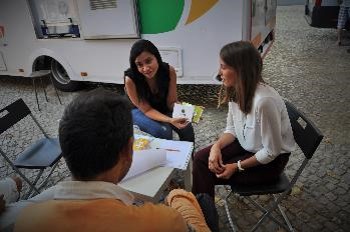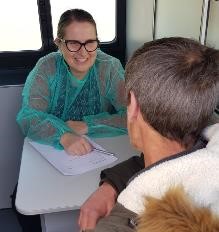Ares do Pinhal Mobile Outreach Program
A Mobile Outreach Programme (MOP) with three vans to provide integrated care for viral hepatitis B (HBV) and C (HCV) among people who use drugs (PWUD). This community very often faces access barriers to prevention, screening and treatment for HCV.
The programme is a collaboration between the non-profit organization ‘Ares do Pinhal’ and three general hospitals in Lisbon: Centro Hospitalar de Lisboa Norte (CHLN); Centro Hospitalar de Lisboa Ocidental (CHLO) and Centro Hospitalar de Lisboa Central (CHLC).
Why?

It is widely established that a key risk factor for HCV transmission is needle sharing, making people who inject drugs (PWID) a high-risk group for infection and dissemination. Harm reduction mobile units have proven very effective in reaching those at-risk of HCV and linking them to HCV prevention, diagnosis and care; particularly as people in this group often face access barriers. Hence, a transition from centralised healthcare services to decentralised and mobile care, involving patients and clinicians alike, can greatly improve access to HCV services among vulnerable groups and accelerate progress towards the WHO elimination goals by 2030.
How?

The MOP comprises three types of mobile units for Opioid Substitution Treatment (OST), medical care, and psychosocial support. The vans operate seven days a week, all year, making daily stops at five strategic locations in Lisbon, in the morning and afternoon. Patients have access to blood and rapid tests, therapy for HBV and HCV and harm-reduction products assisted by a team of nurses and psychosocial workers.
The gastroenterology and hepatology departments of the participating hospitals either provide specialised consultations or assign a medical doctor to assist in the mobile units, facilitating the clinical procedures prior to treatment initiation. Some of the strategies to promote awareness and prevention of HCV include ‘True or False’ games and awareness sessions with peer workers, which are very effective in motivating patients to initiate their treatment.
Outcomes
Between March 2020 and February 2022, a total of 2,115 PWUD took part in the project (1,852 men and 263 women). For HCV, up to 1,000 HCV screenings were conducted with a 0.7% incidence rate and a 59.2% prevalence rate in a two-year period. For HBV, 992 screenings were conducted, with an average prevalence of 3.4%. Overall, it is estimated that there are 300 individuals in the programme who have an active infection and require HCV treatment. 218 people with HCV have been treated, 5 are still receiving treatment and 8 are waiting.
Learnings
Mobility and community involvement are crucial factors for the success of NGO-driven initiatives targeting viral hepatitis amongst at-risk groups.
FUNDING
Public and private funding.
Contact
Cláudia Pereira, Ares do Pinhal
claudia.pereira@aresdopinhal.pt